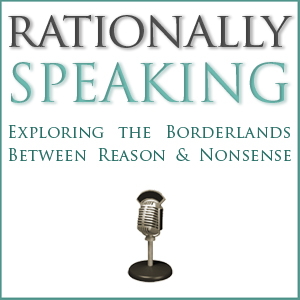Rationally Speaking #164 - James Evans on "Using meta-knowledge to learn how science works"
Rationally Speaking Podcast
New York City Skeptics
4.6 • 787 Ratings
🗓️ 24 July 2016
⏱️ 50 minutes
🧾️ Download transcript
Summary
Transcript
Click on a timestamp to play from that location
| 0:00.0 | Rationally Speaking is a presentation of New York City skeptics dedicated to promoting critical thinking, skeptical inquiry, and science education. |
| 0:22.5 | For more information, please visit us at NYCCEceptics.org. |
| 0:31.2 | Welcome to Rationally Speaking, the podcast where we explore the borderlands between reason and nonsense. |
| 0:41.3 | I'm your host, Julia Galeff, and with me is today's guest, Professor James Evans. |
| 0:46.1 | James is a professor of sociology at the University of Chicago. |
| 0:50.0 | He's also the director of the knowledge lab at the Computation Institute, where he's a senior fellow. |
| 0:58.9 | They use big data and high-performance computing to solve a wide range of scientific and social scientific problems. So that's the area we're going to be focusing on today. |
| 1:03.5 | One of the main things that James studies is what's called meta-knowledge. That's knowledge |
| 1:09.0 | about knowledge. So he's asking questions like, |
| 1:12.6 | has the pace of scientific discovery changed? And if so, why? How do scientists decide what to research? |
| 1:18.8 | How well do different scientific fields communicate with each other? And he's approaching these |
| 1:22.8 | questions in a very empirical way by cashing out these concepts, these questions in concrete terms, |
| 1:28.6 | things that we can measure and get data on. So James, welcome to rationally speaking. |
| 1:33.7 | Thank you, Julia. |
| 1:34.9 | First off, I'm curious about how unusual your approach is within sociology of mining the data |
| 1:41.0 | that gets produced in the process of doing science. Because my impression was that, |
| 1:45.9 | you know, sociologists have asked questions about how science works, how the scientific process |
| 1:50.3 | works for decades. But I've mostly heard them asking these questions in qualitative ways, |
| 1:55.3 | for example, looking at case studies. So how new or strange is your approach? Well, I would say |
| 2:00.2 | there is a field called science studies, and it's composed not just of |
| 2:03.9 | sociologists, but also anthropologists and historians and philosophers of science that has |
| 2:09.8 | been interested in these questions for quite some time. |
... |
Please login to see the full transcript.
Disclaimer: The podcast and artwork embedded on this page are from New York City Skeptics, and are the property of its owner and not affiliated with or endorsed by Tapesearch.
Generated transcripts are the property of New York City Skeptics and are distributed freely under the Fair Use doctrine. Transcripts generated by Tapesearch are not guaranteed to be accurate.
Copyright © Tapesearch 2025.

